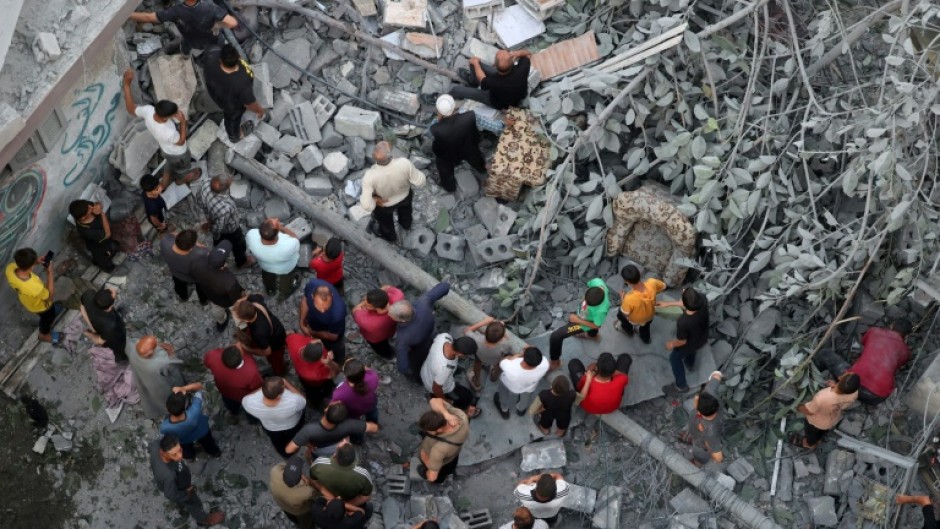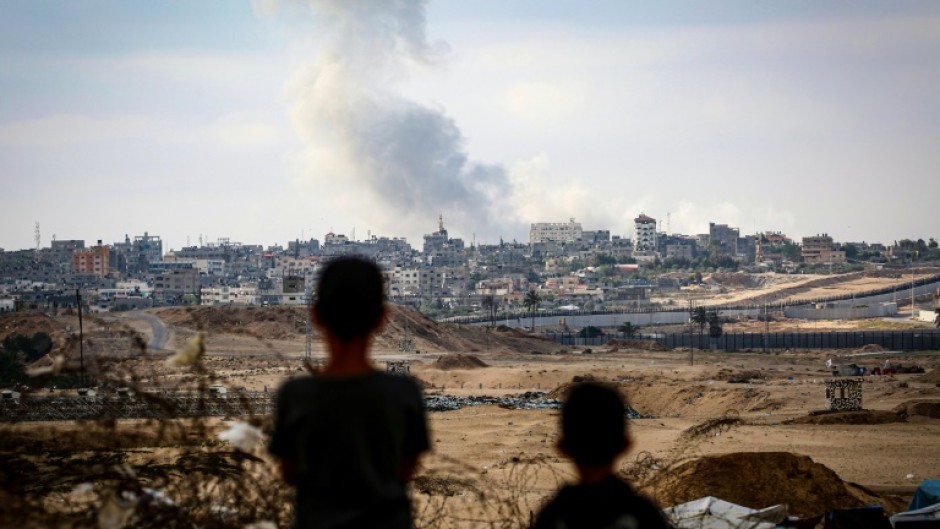Israeli air strikes and artillery pounded Rafah on Saturday, as the government dismissed a UN top court's order to immediately halt its military offensive in the southern Gazan city.
At the same time, renewed international efforts were underway aimed at securing a ceasefire in the war sparked by Palestinian militant group Hamas's unprecedented October 7 attack on Israel.
An Israeli official said on Saturday the government had an "intention" to restart stalled negotiations "this week".
In a case brought by South Africa alleging the Israeli military operation amounts to "genocide", the International Court of Justice ordered Israel to halt its Rafah offensive and demanded the immediate release of hostages still held by Palestinian militants.
The Hague-based ICJ, whose orders are legally binding but lack direct enforcement mechanisms, also instructed Israel to keep open the Rafah crossing between Egypt and Gaza, which Israeli troops took over earlier this month, effectively shutting it.

Israel gave no indication it was preparing to change course in Rafah, insisting the court had got it wrong.
The ruling said Israel must "immediately halt its military offensive, and any other action in the Rafah Governorate, which may inflict on the Palestinian group in Gaza conditions of life that could bring about its physical destruction in whole or in part".
But National Security Adviser Tzachi Hanegbi, in a joint statement with the foreign ministry, said "Israel has not and will not carry out military operations in the Rafah area that create living conditions that could cause the destruction of the Palestinian civilian population, in whole or in part."
Hamas, the Iran-backed Islamist group that has ruled Gaza since 2007, welcomed the ICJ ruling on Rafah but criticised its decision to exclude the rest of the Palestinian territory from the order.
- 'Nothing left here' -
Israel carried out strikes throughout the Gaza Strip early on Saturday as fighting raged between the army and Palestinian militants.

Witnesses and AFP teams reported Israeli strikes or shelling in Rafah, the central city of Deir al-Balah, Gaza City and Jabalia refugee camp in the north, and elsewhere.
"We hope that the court's decision will put pressure on Israel to end this war of extermination because there is nothing left here," said Umm Mohammad Al-Ashqa, a Palestinian woman from Gaza City displaced to Deir al-Balah by the war.
Mohammed Saleh, also interviewed by AFP in the central Gazan city, said Israel "considers itself above the law" and would not stop "the shooting or the war".
Yahya, a 34-year-old in Gaza who did not give his full name for security concerns, said: "Perhaps these decisions... that Israel has not complied with, will make the Western world move more strongly (in favour) of our cause."
The ICJ ruling came days after Ireland, Spain and Norway said they would formally recognise a Palestinian state -- a move the leaders of two other European states, Germany and Portugal, said Friday they were not ready to join.
Spanish Foreign Minister Jose Manuel Albares said on Saturday that "the precautionary measures set out by the ICJ... are compulsory. Israel must comply with them."
The ruling also followed requests by the International Criminal Court prosecutor, Karim Khan, to issue arrest warrants for Israeli Prime Minister Benjamin Netanyahu, his defence minister, and three top Hamas leaders on suspicion of war crimes and crimes against humanity.

It also instructed Israel to open the Rafah crossing for the "unhindered provision at scale" of humanitarian aid and also called for the "immediate and unconditional release" of the hostages held by Hamas in Gaza.
- Paris meetings -
The Gaza war broke out after Hamas's October 7 attack resulted in the deaths of more than 1,170 people, mostly civilians, according to an AFP tally based on Israeli official figures.
Militants also took 252 hostages, 121 of whom remain in Gaza, including 37 the army says are dead.
Israel's retaliatory offensive has killed at least 35,903 people in Gaza, mostly women and children, according to data from the Hamas-run territory's health ministry.

On the diplomatic front, efforts have resumed to seek the first ceasefire in Gaza since a week-long truce and hostage release in November.
The Israeli official, requesting anonymity to discuss the negotiations, told AFP that "there is an intention to renew these talks this week, and there is an agreement."
The official did not elaborate on the agreement, but Israeli media said Mossad chief David Barnea had agreed with US and Qatari mediators on a new framework for negotiations.
Barnea met with CIA chief Bill Burns and Qatari Prime Minister Mohammed bin Abdulrahman Al-Thani over the weekend in Paris in a bid to relaunch negotiations, the reports said.
The Qatari premier on Friday also attended a five-way meeting in Paris with President Emmanuel Macron and the foreign ministers of Saudi Arabia, Egypt and Jordan over the Gaza war and ways to set up a Palestinian state alongside Israel, the French presidency said.

Israel sent tanks and troops into Rafah in early May, defying global opposition. It has since ordered mass evacuations from Rafah, with the UN saying more than 800,000 people have fled the city.
Troops took over the Palestinian side of the Rafah border crossing with Egypt, further slowing sporadic deliveries of aid for Gaza's 2.4 million people.
The White House said on Friday that Egypt had agreed to temporarily send UN aid through another crossing, Kerem Shalom near Rafah, on Gaza's border with Israel.

The security and humanitarian situation in the besieged territory remains alarming, with a risk of famine and most hospitals no longer functioning.
The Kuwait Speciality Hospital in Rafah pleaded for fuel deliveries on Saturday "to ensure its continued operation", saying it was the only one in the area still receiving patients.


